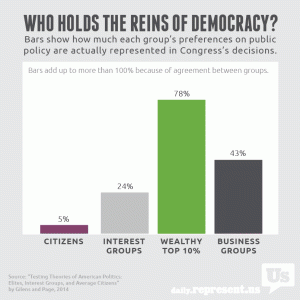
In the 2010 federal elections, a quarter of all campaign donations came from the top 1% of the top 1% of Americans, by wealth; who gave $10,000 or more. The differences are much more extreme now.
Posts Tagged ‘Campaign Contributions’
The money vote
October 10, 2016How the power of money was unleashed
October 8, 2016
.
In a way, the enormous amounts of money that are spent in U.S. elections reflects the democratic nature of American institutions.
If the political process were controlled by a few party leaders, as during the Gilded Age of the late 19th century and other times in the past, it wouldn’t cost so much to control the process.
Many reforms were enacted in the 20th century to limit corporate power and make the government more democratic. The Tillman Act of 1907 forbid corporations to contribute to political candidates or elections. The Constitution was amended in 1913 so that Senators would be elected by the public instead of chosen by state legislators.
Over time limits were placed on campaign spending, and the Democratic and Republican parties began to nominate their candidates through primary elections rather than party conventions.
These reforms made possible the legislation of the Progressive era and the New Deal, which subjected corporations to unprecedentedly strict regulation and rich people to taxation at top rates reaching 90 percent, while providing Social Security, unemployment insurance and extensive public works.
Business leaders made a concerted and successful effort to turn things around. They altered the climate of opinion, both among educated people and the public. They supported candidates committed not only to the interests of particular businesses, but support of unrestricted capitalism in general.
And they worked through the courts, just as liberals had, to change the limits of what was legally permissible.
What follows is a (very incomplete) list of milestones in their progress, with an emphasis on the legal milestones.
Daily Kos writer smears Jill Stein
August 9, 2016Jill Stein is a fraud. Check out her list of campaign contributors per the FEC. The top five donations are from corporate interests — AON, Xoom Global Money Transfer, IBM, Thoughtworks, and UPS. Would Bernie take money from any of these?
Source: Daily Kos

Jill Stein
This sounds bad, doesn’t it? Corporations are barred from making contributions directly, but the Vote Smart web site editors track the affiliations of individual contributors—which can be top level executives or rank-and-file workers.
The answer to the question is that Bernie Sanders would have taken $27 donations from employees of any of these organizations.
Here are the facts.
Vote Smart reported that Jill Stein has raised $859,155 so far in this election. The top affiliations of contributors were:
- $2,700 from AON, an insurance company.
- $2,600 from Xoom Global Money Transfer
- $2,000 from IBM Corp.
- $2,000 from Thoughtworks
- $1,550 from UPS.
Does that seem like big money? Compare this with Hillary Clinton, who has raised $264 million—more than 300 times as much. The top affiliations of her contributors were:
- $641,593 from the University of California
- $432,615 from Emily’s List, which supports feminist and women candidates.
- $426,910 from Alphabet Inc. (Google)
- $414,532 from Morgan & Morgan, a law firm specializing in personal injury cases.
- $330,433 from Morgan Stanley.
Vote Smart reported that Donald Trump has raised $89 million. The top affiliations of his contributors are:
Donald Trump sets a trap for his campaign donors
August 6, 2016Donald Trump’s campaign web site provides no way for campaign contributors to cancel recurring donations.
Once you sign up, there is no apparent way to stop giving—unless you cancel your credit card or possibly arrange with your bank to stop payments.
Hillary Clinton’s campaign web site has a “remove” button for those who want to stop payments.
LINK
Donald Trump’s web site won’t allow you to cancel recurring donations by Jeremy Stahl for Slate. (Hat tip to Joseph Cannon).
 Martin Gilens of Princeton and Benjamin Page of Northwestern looked at 1,779 issues on which Americans were polled from 1981 through 2002, and then how Congress acted on these issues.
Martin Gilens of Princeton and Benjamin Page of Northwestern looked at 1,779 issues on which Americans were polled from 1981 through 2002, and then how Congress acted on these issues.